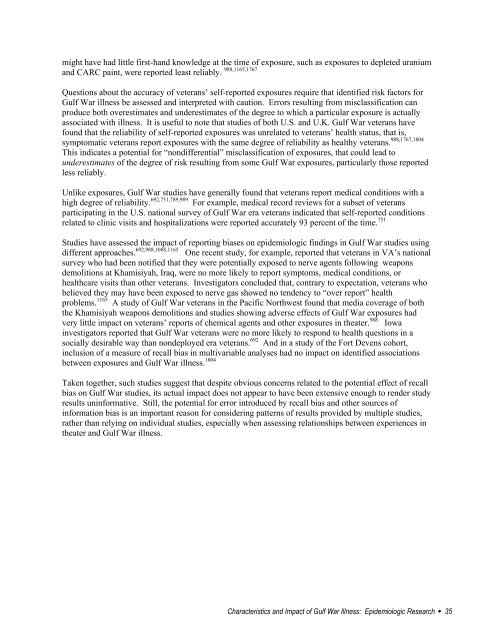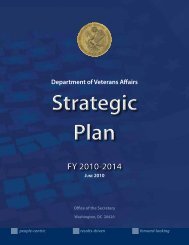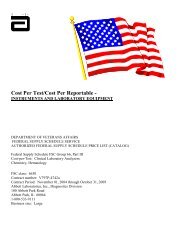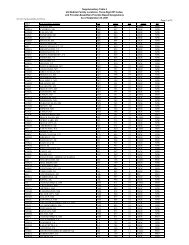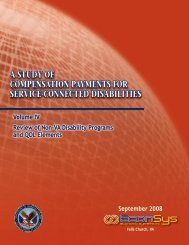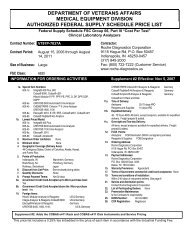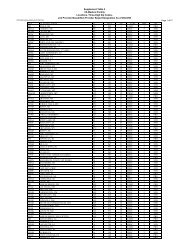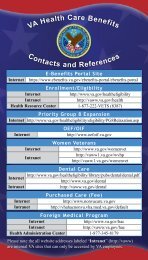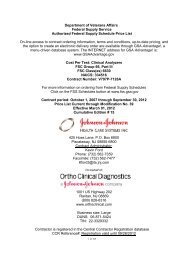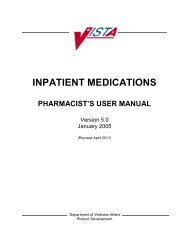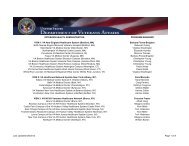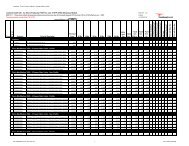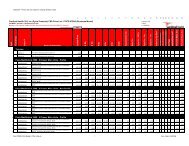- Page 1: Gulf War Illness and the Health of
- Page 4 and 5: Research Advisory Committee on Gulf
- Page 6 and 7: Research Advisory Committee on Gulf
- Page 8 and 9: Table of Contents 2| What Caused Gu
- Page 10 and 11: Table of Contents Appendices Append
- Page 12 and 13: Gulf War illness is associated with
- Page 14 and 15: described throughout the report, sc
- Page 16 and 17: Other Health Issues Affecting Gulf
- Page 18 and 19: evidence that exposure to oil fire
- Page 20 and 21: epellants, sarin, and stress, at do
- Page 22 and 23: specialized SPECT scan analyses. In
- Page 24 and 25: amounts of PON1 differ, sometimes d
- Page 26 and 27: The Committee identified major prob
- Page 28 and 29: 18 • Gulf War Illness and the Hea
- Page 30 and 31: health problems have been the subje
- Page 32 and 33: psychological stress of war to the
- Page 34 and 35: e studied as a “multisymptom illn
- Page 36 and 37: Table 1. Prevalence of Multisymptom
- Page 38 and 39: Table 2. Symptom Domains Affecting
- Page 40 and 41: likely to report a number of other
- Page 42 and 43: indicate that Gulf War illness did
- Page 46 and 47: Gulf War Illness Prognosis and the
- Page 48 and 49: improvement on veterans’ SF36 PCS
- Page 50 and 51: was provided for Committee review i
- Page 52 and 53: Research studies have not supported
- Page 54 and 55: deployment. This excess could be of
- Page 56 and 57: have asked veterans to report if th
- Page 58 and 59: A number of theories have been put
- Page 60 and 61: children born to male Gulf War vete
- Page 62 and 63: The long-anticipated results of thi
- Page 64 and 65: affect Gulf War veterans at excess
- Page 66 and 67: Recommendations Despite the brief d
- Page 68 and 69: Operation Desert Storm: Summary of
- Page 70 and 71: The Committee used a standardized a
- Page 72 and 73: The word “stress” is used in a
- Page 74 and 75: War and the subsequent development
- Page 76 and 77: Taken together, human and animal st
- Page 78 and 79: The lack of association between com
- Page 80 and 81: Table 4. Prevalence of Post Traumat
- Page 82 and 83: Other studies have reported both hi
- Page 84 and 85: Recommendation Evidence from multip
- Page 86 and 87: winds helped to rapidly dissipate t
- Page 88 and 89: Overall, results from environmental
- Page 90 and 91: after ignition of the oil wells. Ac
- Page 92 and 93: to the risk of developing Gulf War
- Page 94 and 95:
Recommendations Based on available
- Page 96 and 97:
About 320 tons of DU was used durin
- Page 98 and 99:
adiological and chemical effects. 1
- Page 100 and 101:
Table 1. Health Effects of Depleted
- Page 102 and 103:
Table 2. Brain and Behavioral Effec
- Page 104 and 105:
Table 3. Genotoxic, Mutagenic, and
- Page 106 and 107:
problems reported by Canadian Gulf
- Page 108 and 109:
example, prolactin levels were sign
- Page 110 and 111:
Recommendations Preliminary evidenc
- Page 112 and 113:
Table 1. Vaccines Routinely Given t
- Page 114 and 115:
shots in theater, in January and Fe
- Page 116 and 117:
effects from receiving multiple vac
- Page 118 and 119:
Accounting Office (GAO, now the Gov
- Page 120 and 121:
Table 4. Studies Identifying Rates
- Page 122 and 123:
Table 5. Studies Assessing Longer-t
- Page 124 and 125:
an arthralgia-related multisymptom
- Page 126 and 127:
The squalene controversy has been m
- Page 128 and 129:
vaccine formulation, and concluded
- Page 130 and 131:
Although squalene has been the prim
- Page 132 and 133:
observation period, with improved s
- Page 134 and 135:
differed from those administered pr
- Page 136 and 137:
current use is the same as that of
- Page 138 and 139:
Cholinergic and Related Neurotoxica
- Page 140 and 141:
Pyridostigmine bromide (PB) use in
- Page 142 and 143:
Table 2. Pesticides and Insect Repe
- Page 144 and 145:
Although comprehensive information
- Page 146 and 147:
Committee broadly reviewed informat
- Page 148 and 149:
more significant symptoms and signs
- Page 150 and 151:
agent as a result. But based on rou
- Page 152 and 153:
Questions about Khamisiyah models a
- Page 154 and 155:
Figure 2. Iraqi Chemical Weapons Fa
- Page 156 and 157:
use of chemical agents during the G
- Page 158 and 159:
even at higher doses. Additional ef
- Page 160 and 161:
sweating. Symptoms are reported by
- Page 162 and 163:
vulnerability to adverse effects of
- Page 164 and 165:
Civilian use DEET formulations typi
- Page 166 and 167:
disease and exposure to pesticides
- Page 168 and 169:
The IOM committee also found that e
- Page 170 and 171:
Table 4. Studies Evaluating Persist
- Page 172 and 173:
very high, only rats with the high
- Page 174 and 175:
In 1979, investigators from Harvard
- Page 176 and 177:
central nervous system effects, in
- Page 178 and 179:
Table 5. Effects of Combined Gulf W
- Page 180 and 181:
Table 6. Animal Studies Evaluating
- Page 182 and 183:
and up to 60 days in different stud
- Page 184 and 185:
clinical research unit, subjects we
- Page 186 and 187:
At 16 weeks, brain acetylcholine le
- Page 188 and 189:
veterans with PB, pesticides, and v
- Page 190 and 191:
The Committee has reviewed results
- Page 192 and 193:
exposures. Although subject to conf
- Page 194 and 195:
and healthcare utilization are simi
- Page 196 and 197:
Recommendations During the 1990-199
- Page 198 and 199:
endemic to the region and/or those
- Page 200 and 201:
positive antibody titers to this vi
- Page 202 and 203:
The most informative research of th
- Page 204 and 205:
Table 3. Post-War Assessment of Inf
- Page 206 and 207:
this activation may have resulted f
- Page 208 and 209:
Anthrax causes an acute and serious
- Page 210 and 211:
Recommendations Because of unanswer
- Page 212 and 213:
that, during the months that oil fi
- Page 214 and 215:
neurological and cardiovascular eff
- Page 216 and 217:
fires and tent heaters. During the
- Page 218 and 219:
control blowing sand, which may hav
- Page 220 and 221:
eport indicated that of the approxi
- Page 222 and 223:
Other Potential Hazards Encountered
- Page 224 and 225:
Recommendations A number of exposur
- Page 226 and 227:
evidence of an association was stro
- Page 228 and 229:
of reasons, including the well-reco
- Page 230 and 231:
findings to the Gulf War experience
- Page 232 and 233:
Table 2. Gulf War Illness in Relati
- Page 234 and 235:
Overview of the Evidence Linking Gu
- Page 236 and 237:
War illness and low-level nerve age
- Page 238 and 239:
228 • Effects of Gulf War Experie
- Page 240 and 241:
Biological and Clinical Characteris
- Page 242 and 243:
Brain and Central Nervous System Al
- Page 244 and 245:
Table 2. Published EEG and Brain Im
- Page 246 and 247:
The Committee also reviewed prelimi
- Page 248 and 249:
Table 4. Neurocognitive Evaluation
- Page 250 and 251:
Table 5. Neurocognitive Evaluation
- Page 252 and 253:
As previously described, VA investi
- Page 254 and 255:
Table 4. Published Studies of Auton
- Page 256 and 257:
Many of the research limitations de
- Page 258 and 259:
Table 7. Studies Assessing Sensory
- Page 260 and 261:
In several recently-reported studie
- Page 262 and 263:
Five of the six Gulf War projects i
- Page 264 and 265:
Overall, differences between studie
- Page 266 and 267:
BChE projects, was that mean BChE a
- Page 268 and 269:
Table 7. Immune Evaluation of Gulf
- Page 270 and 271:
specifically at T cell responses to
- Page 272 and 273:
symptomatic Gulf War veterans were
- Page 274 and 275:
Table 10. Clinical Findings in Symp
- Page 276 and 277:
Genetic findings in symptomatic Gul
- Page 278 and 279:
In attempting to understand the bio
- Page 280 and 281:
Multisymptom illness associated wit
- Page 282 and 283:
widespread pain, cognitive difficul
- Page 284 and 285:
Gulf War Illness in Relation to Mul
- Page 286 and 287:
Table 1. Prevalence of Fatigue and
- Page 288 and 289:
ate of FM among family members of F
- Page 290 and 291:
eported that MCS patients have sign
- Page 292 and 293:
Research findings in multisymptom c
- Page 294 and 295:
e common to both CFS and Gulf War i
- Page 296 and 297:
Most notably, a burgeoning number o
- Page 298 and 299:
Recommendations Research studies ha
- Page 300 and 301:
Historical Funding and Management o
- Page 302 and 303:
Since 2002, VA has sponsored a stea
- Page 304 and 305:
Table 2. Examples of Psychiatric an
- Page 306 and 307:
treating Gulf War illness, on long-
- Page 308 and 309:
connection with the Gulf War. They
- Page 310 and 311:
from the portfolio of studies ident
- Page 312 and 313:
available, potentially promising tr
- Page 314 and 315:
ecent data that characterize VA hea
- Page 316 and 317:
The WRIISCs were established both t
- Page 318 and 319:
Congressional actions have brought
- Page 320 and 321:
310 • Research Priorities and Rec
- Page 322 and 323:
Research to identify specific patho
- Page 324 and 325:
Other Research Areas of Importance
- Page 326 and 327:
316 •
- Page 328 and 329:
Ms. Angela Newbold, Mr. Kevin Smith
- Page 330 and 331:
September 19-21, 2005 (Washington,
- Page 332 and 333:
September 15-16, 2008 (Washington,
- Page 334 and 335:
21. Abu-Qare AW, Abou-Donia MB. Det
- Page 336 and 337:
73. Assefi NP, Sherman KJ, Jacobsen
- Page 338 and 339:
126. Benmoyal-Segal L, Vander T, Sh
- Page 340 and 341:
181. Brown VJ. Battle scars: global
- Page 342 and 343:
238. Cheng Y-S. Chemical compositio
- Page 344 and 345:
295. Crofford LJ, Rowbotham MC, Mea
- Page 346 and 347:
349. Dockery DW, Behbehani J, Fay M
- Page 348 and 349:
404. Engel CC, Hyams KC, Scott K. M
- Page 350 and 351:
460. Friedman A, Kaufer D, Shemer J
- Page 352 and 353:
512. Grabenstein JD. Drug interacti
- Page 354 and 355:
567. Haley RW, Maddrey AM, Gershenf
- Page 356 and 357:
620. Holmes DT, Tariot PN, Cox C. P
- Page 358 and 359:
676. Institute of Medicine. Health
- Page 360 and 361:
732. Joy RM, Walby WF, Stark LG, Al
- Page 362 and 363:
786. Kellner M, Baker DG, Yehuda R.
- Page 364 and 365:
836. Krengel M, Sullivan K. Neurops
- Page 366 and 367:
890. Lestaevel P, Houpert P, Bussy
- Page 368 and 369:
945. Mach M, Grubbs RD, Price WA, N
- Page 370 and 371:
999. McDiarmid MA, Squibb K, Engelh
- Page 372 and 373:
1052. Miranda ML. Spatial analysis
- Page 374 and 375:
1107. Nemmar A, Hoet PH, Vanquicken
- Page 376 and 377:
1161. Ottenweller JE. Paraoxonase A
- Page 378 and 379:
1215. Pittman PR, Kim-Ahn G, Pifat
- Page 380 and 381:
1273. Research Working Group of Mil
- Page 382 and 383:
1329. Russell IJ. Abnormal T cell s
- Page 384 and 385:
1382. Seidel MF, Weinreich GF, Stra
- Page 386 and 387:
1433. Smith TC, Gray GC, Weir JC, H
- Page 388 and 389:
1486. Stevens D, Scott EA, Bowditch
- Page 390 and 391:
1539. Tian H, Song X, Bressler J, P
- Page 392 and 393:
1586. U.S. Army Environmental Hygie
- Page 394 and 395:
and Risk Characterization of U.S. D
- Page 396 and 397:
1679. U.S. General Accounting Offic
- Page 398 and 399:
1730. Vojdani A. Scientific reality
- Page 400 and 401:
1786. Wijeratne C, Hickie I, Davenp
- Page 403:
| Appendices
- Page 406 and 407:
396 • Results from Studies of Gul
- Page 408 and 409:
398 • Results from Studies of Gul
- Page 410 and 411:
400 • Results from Studies of Gul
- Page 412 and 413:
402 • Results from Studies of Gul
- Page 414 and 415:
404 • Results from Studies of Gul
- Page 416 and 417:
406 • Results from Studies of Gul
- Page 418 and 419:
408 • Results from Studies of Gul
- Page 420 and 421:
410 • Results from Studies of Gul
- Page 422 and 423:
412 • Results from Studies of Gul
- Page 424 and 425:
414 • Results from Studies of Gul
- Page 426 and 427:
416 • Results from Studies of Gul
- Page 428 and 429:
418 • Results from Studies of Gul
- Page 430 and 431:
420 • Results from Studies of Gul
- Page 432 and 433:
422 • Results from Studies of Gul
- Page 434 and 435:
424 • Results from Studies of Gul
- Page 436 and 437:
426 • Results from Studies of Gul
- Page 438 and 439:
428 • Results from Studies of Gul
- Page 440 and 441:
430 • Results from Studies of Gul
- Page 442 and 443:
432 • Results from Studies of Gul
- Page 444 and 445:
434 • Results from Studies of Gul
- Page 446 and 447:
436 • Results from Studies of Gul
- Page 448 and 449:
438 • Research Advisory Committee
- Page 450 and 451:
other information sources it finds
- Page 452 and 453:
442 • Research Advisory Committee
- Page 454 and 455:
Joel C. Graves, DMin Rev. Graves is
- Page 456 and 457:
446 • Gulf War Illness and the He
- Page 458 and 459:
448 • Gulf War Illness and the He
- Page 460 and 461:
corr correlation CPAP Continuous Po
- Page 462 and 463:
MCS MDA MDPH 2ME MEG MF59 MHPG MOD
- Page 464:
Th2 TNF TSPs U.K. U.N. UNSCOM USACH


